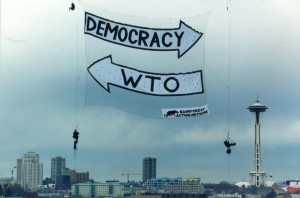Nonviolent direct action seeks to create such a crisis and foster such a tension that a community which has constantly refused to negotiate is forced to confront the issue. It seeks so to dramatize the issue that it can no longer be ignored.
–Martin Luther King Jr.
I recently saw the new German film “The Baader-Meinhof Complex” where activists from Germany’s student left are radicalized by brutal police repression and anti-imperialist ideology during the 1960’s and form the Red Army Faction. Hence, they undergo a transformation from protesters to blockaders to saboteurs to gun toting revolutionaries and urban guerrillas robbing banks, kidnapping bankers and assassinating politicians. They form cells that fight the state and capitalism but are eventually caught or killed by the police state. Many commit suicide while in police custody.

It really struck me how they went from using Gandhi and King’s strategies of non-violent direct action to Che’ and Fidel Castro’s strategy of armed struggle. I don’t think armed struggle works in highly industrialized, highly militarized, highly armed societies. Faced with an overwhelming police state, mass movement building, non-violent direct action and coalition building is what puts true fear in the hearts of politicians and capitalists.
Since it’s founding Rainforest Action Network (RAN) has campaigned for the forests, their inhabitants and the natural systems that sustain life by transforming the global marketplace through education, grassroots organizing, and non-violent direct action.
Non-violent direct action. The organization’s use of it is what attracted me to RAN. In 1988, as a college student, my friends and I participated in the RAN’s first direct action campaign against Burger King. Burger King was importing cheap beef from tropical countries where rainforests are denuded to provide pasture for cattle. This campaign succeeded in many ways.
In 1999, one of RAN’s most known direct actions dropped the “WTO-Democracy” banner off a crane in the week prior to World Trade Organization’s (WTO) shutdown in Seattle. That banner hang was even dramatized in a feature film starring Charlize Theron and Woody Harrelson (although being on the inside of many a banner action, the facts on how to do it were very off, to say the least). RAN also played a major part in the non-violent blockades at the WTO which, as Dr. King puts above, created such a crisis and fostered such tension that issues surrounding corporate globalized were confronted and dramatized.
It’s an important strategy that separates RAN, Greenpeace, Students for a Free Tibet and a few other groups from mainstream non-profit organizations. It’s risky and has gotten us into trouble more than once. Still, highly trained climb teams participating in recent actions in West Virginia, Mt. Rushmore, Niagara Falls and Pittsburgh, Earth First! and Climate Ground Zero defending wilderness and mountains with tree-sits or Code Pink sitting in their congressperson’s office all strike me as better uses of energy and resources than armed struggle.
In the civil rights, human rights, environmental and anti-corporate globalization movements, non-violent direct action has been an important tool in giving women the right to vote, ending segregation, stopping the construction of U.S. nuclear plants, saving thousands of acres of forest and rainforest and putting transnational institutions like the WTO and the World Bank into crisis (actually stopping the WTO). Now we’re using it to fight for climate justice. It’s not always a popular way to go. The right often villianizes us as terrorists and passes laws to make it easier to prosecute us over it. The far left criticizes us for being too soft.
Last week, 1500 surrounded and shut down a coal burning power plan in Denmark in the lead up to the UN climate negotiations in Copenhagen. In Pittsburgh, thousands marched against the G20 despite heavy heavy police repression. Across California students, faculty and labor walked out of all UC campus over fee cuts and tuition hikes, this mobilization included a 5,000 person rally, march and mass action in Berkeley. Our people powered uprisings and non-violent direct action continue to assert our power in these troubling economic and environmental times.